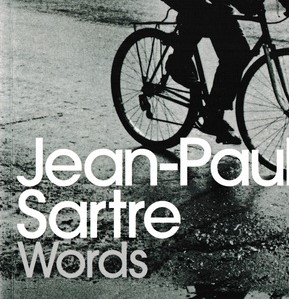Nausea brings to us a man’s struggle to come to terms with his own existence. Antoine Roquentin is disgusted with his everyday existence. Being without family, friends, or a vocation, his solitary existence gives him plenty of time to reflect on the meaning of his existence. What he finds in answer to his search is only nothingness. He ponders on the actions of humans, including himself, who are ignorant of this real nature of the world, and finds these actions absurd. This absurdity that surrounds him, almost drowning him, makes him nauseous.
The plotless story is rather a study of Antoine’s thoughts and conducts as he struggles to make a meaningful existence. He finds his whole life in utter disarray. “For me, there is neither Monday nor Sunday: there are days which pass in disorder, and then, sudden lightning like this one”. The “sudden lightning” is the moment of happiness when he feels one with nature, but he cannot help falling into despair again when he deals with the world around him. He doesn’t understand why he is here, for what purpose. “I hadn’t the right to exist. I had appeared by chance, I existed like a stone, a plant, or a microbe. My life put out feelers towards small pleasures in every direction”.
In his search to find the true meaning of existence, he first discovers that most of the existences are relative. That is to say, most of the existences are formed in relation to some other person, object, concept, or the past. “I was neither father nor grandfather, not even a husband. I did not have a vote, I hardly paid any taxes: I could not boast of being a taxpayer, an elector, nor even of having the humble right to honour which twenty years of obedience confers on an employee. My existence began to worry me seriously.” This worry intensifies, Antoine’s nausea. He realizes that the task he has set for himself – to write a book on the history of the Marquis de Rollobon – is his way of desperately anchoring his existence to something, even if it’s a dead person from the past. Disgusted, he abandons this task and tries another avenue to which he could anchor his existence. He meets his former girlfriend, Anny, and seeks through her to steady his sinking ship. But this effort too is frustrated, and he finds himself drifting further and further into turbulent waters. Antoine feels completely lost. Then, all of a sudden, he is enlightened. “The true nature of the present revealed itself: it was what exists, and all that was not present did not exist. Not in things, not even in my thoughts.” Antoine finds that the true existence is what exists at present, at this present moment, divorced from the past. And he also realizes that “things are divorced from their names” and that all these things are only “strange images” that “represented a multitude of things”. They are “not real things”, but “things which looked like them. Wooden objects which looked like chairs, shoes, other objects which looked like plants.” Sartre believed that “existence preceded essence” and that the “essence” or rather the “characteristics” of objects are just “facades” to hide the unexplainable nature of existence. So, things are only objects, and they exist without us giving them any “characteristic”. And finally, he understands, what he is. “And just what is Antoine Roquentin? An abstraction. A pale reflection of myself wavers in my consciousness. Antoine Roquentin…and suddenly the “I” pales, pales, and fades out”.
With this realization comes the understanding that each of us is responsible for creating a purpose or meaning for ourselves. And for Antoine, there is only one solution to save himself and cure him of his nausea. That is to create an artistic product, not of the past as he tried to do with Marquis de Rollobon, but of the present, and to pour his whole self into it and solidify his existence through it. Existentialists believed that artistic creation is an important aspect of existence. So we can understand why Sartre presented the simple solution of artistic creation as the way of understanding oneself thus curing Antoine Roquentin’s nausea.
Nausea is a classic existentialist novel. It expounds on the vital aspects of existentialism and paints a good portrait of Sartre’s beliefs on existence. It is an important philosophical work and probably one of the best works that explain existentialism. But reading it is quite another matter. It needs a hundred percent of concentration and a good percentage of brainpower to understand what Sartre was driving at. It is not easy to fish out the essentials from the multitude of ideas that Sartre presents in this work. It is a profound work, and I by no means claim to have understood it all. Yet, though it was quite a difficult experience, I’m glad to have read what is considered the fictional masterpiece of Sartre. ” I stand by one thing, which is Nausea. . . . It’s the best of what I’ve done” This is how Sartre felt of his Nausea. And who are we to contradict the author?
Rating: 3/5



